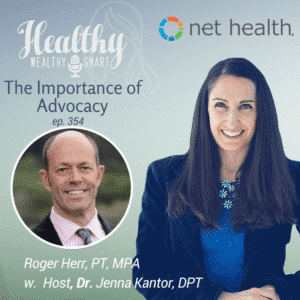Healthy, Wealthy, & Smart Episode 354: The Importance of Advocacy
Dr. Jenna Kantor hosts and interviews Roger Herr on advocacy in Physical Therapy. Roger Herr, the Secretary of the Board of Directors of the American Physical Therapy Association (APTA), discusses the importance of advocacy. He also covers how loose guidelines to land a leadership position, different perspectives enriching professional advocacy, and more!

Welcome to the Healthy Wealthy & Smart podcast. Each week we interview the best and brightest in physical therapy, wellness, and entrepreneurship. We give you cutting edge information you need to live your best life, healthy, wealthy, and smart. The information in this podcast is for entertainment purposes only. You should not be used as personalized medical advice. And now here’s your host, Dr. Karen Litzy.
Hey, everybody, welcome back to the podcast. Today’s episode is brought to you by Net Health. So if you’re looking for an EMR to expand your visit capacity, get paid for your services, ramp up patient engagement and eliminate worries about documentation and compliance, then check out ReDoc, powered by xfit. It’s a cloud based, fully integrated EMR and billing solution. So you can get all of your billing, your coding, and compliance off your hands and let the experts at Net Health do it for you. To learn more about ReDoc and complete revenue cycle management services, check them out at nethealth.com/healthy. All right, on to today’s episode. I am so happy to announce that Dr. Jenna Kantor will be a permanent cohost here at Healthy Wealthy & Smart. So Jenna did a couple of interviews at CSM when she was a student at Columbia. Now she is a full fledged graduate from Columbia University, from their physical therapy program, and she is going to be a permanent cohost here at Healthy Wealthy & Smart.
So we’re going to be hearing great interviews from her every month, and today’s interview is no exception. So Jenna sat down with Roger Herr at the Federal Advocacy Forum last month. Roger is the secretary of the board of directors of the American Physical Therapy Association. He is a graduate of Temple University, and has practiced physical therapy on both the east and west coasts. His involvement in the APTA has been long standing at local, state, and national levels. He is passionate about making a difference and communicating that to his audience. And Roger has been part of Federal Advocacy Forum, and advocacy for the profession for years. So we’re so lucky to have him sit down with Jenna and talk about why advocating for physical therapy is important, how each generation of leaders enhance New York’s advocacy efforts, loose guidelines to follow to land a leadership position, and why different perspectives enrich professional advocacy.
So a huge thanks to Dr. Jenna Kantor, and a huge thanks to Roger Herr for coming on the podcast this week. So enjoy!
Hello, I am Jenna Kantor and I am hosting for the podcast Healthy Wealthy & Smart. And today I get to be with Roger Herr, who is the secretary of the APTA. And today we are going to be discussing the unwritten rules in advocating for the PT profession, which I’m really excited about. Roger has become a very fast and amazing mentor of mine, and somebody I consult with regularly in New York. So first of all, thank you for just even agreeing to be a guest on this podcast.
Thank you.
This is incredible. You guys have no idea, such such a humble and amazing human being. All right. So the first question, why do you love advocating for physical therapy?
I love advocating because we get to explain what we do to others, and translating that. Because we’re good at explaining clinical language to ourselves, but making others understand it, whether it’s a policy maker, a rule maker, or someone that impacts a health plan or others, the advocacy role is to explain physical therapy to others that are not familiar, but they impact us. So we need to really interact with them and not trust that they’ll understand physical therapy, just because we do.
Right. You go beyond the assumption and you can have more of a conversation.
Right.
Which is great, I love that. So our district, which is greater New York for Roger and I, had had some long time leaders who have been involved with the profession. They are just amazing human beings who are so wise and can really just lead so wonderfully by example. However, I have noticed that there hasn’t been a real change in leadership. Could you explain why that might possibly be the case at this moment?
Yeah and from my experience, when I first entered the PPT profession, I came to New York city as a new grad. We had some esteemed colleagues, teachers, professors, practitioners. So they took leadership roles and they’re very passionate. And what I’ve learned is that we’ve got different generations, and different generations have different attributes. So some people feel by being active, you need to contribute and taking that leadership role. But then that doesn’t make room for others to step in. Another challenge of our district specifically is a lot of people come to New York city for their first job, and then life takes them elsewhere.
I never thought of that.
Whether they buy a house, they have a family, they go elsewhere in their career. But you know, we’ve got so many great medical institutions in New York that people go there for their first job and learn a lot. But at the same point as you evolve. So we have a lot of people just like our current district chair, she lives in New Jersey now. And so she’s becoming more active there as she moves out of our district. And so that’s just been a natural churn, which I think is healthy because you meet a lot of people that you’ll cross paths with later in life. But it also means, then, the more senior people, they’re living there for the rest of their career as compared to the people that pass through, in and out.
That absolutely makes sense. So that being said, do you think there is some sort of age or experience role in taking on leadership positions? Is that a prerequisite, would you say?
I would say less on the age. It is demonstrating that you’re engaged and active in the district. And so traditionally, people did that by how many meetings you went to, and then how many things you got involved with. And then, after you’ve been involving and connecting with the district, then getting slated and things like that. So there was that process. But given that our district has this churn of people that come in and out of New York, just as they’re getting themselves established, then life changes and they do other things, and that’s great. But it also means then people are always starting fresh, are always new in our district.
And so that disparity in your really elders that feel that they need to hand off the reins to people who have demonstrated really knowledge, and handing that off, as compared to people who want to do specific things and jump right in. And it’s just a difference in approach. But I think our society has less of that legacy role and more, like what do we need to do now? And I think the world is changing in that, just like what you’re using in media and how you’re communicating with others doesn’t need to be a district meeting. People can go online and learn about us.
Yeah, that’s true. It’s true.
And that wasn’t around before. The only way was in person, and a lot of us graduated, and love that in person and thrive on that, but there are other ways to get engaged and be involved, and you guys are demonstrating that to us. You will take it there.
Yeah. Actually, bouncing off what you were just saying. So you were saying that there’s these newer clinicians coming in and usually they’re in greater New York specifically for just a certain period of time. And then they ended up moving, either to a different state or different districts. So it’s something pretty unique to greater New York specifically. So my question is, is there something in place, like a written kind of game plan because that happens so regularly? And people will be coming in wanting those leadership roles, but then they’ll be moving. Is there anything set in place or does that have yet to be created?
So this is where I struggle, because I think written rules or guidelines give a path, but there are so many untraditional paths in our profession. And so I want to embrace that, because I followed a non-traditional path. I grew up in the district in New York, but then I got very involved with my section and got active nationally through my section as compared to the district, to the chapter, and my national involvement. However, I’ve been able to blend those activities now that I’ve been active on a national level, being involved in my chapter and my section. But people would say that the traditional way is to grow up through that district, to the chapter, to the national level. But I don’t want to say there aren’t other ways, because I look at the people that come to the advocacy forums, and what engages them is advocacy on their legislators, whether it’s state or federal, and that’s not always being active in your district. That might be being your federal affairs liaison role type-
It’s a totally different picture. Yeah.
Right. But it engages people in a passionate way and different way, and that’s good. We need those different strengths in our team. So yeah, things aren’t written out and there used to be a in-person, come to meetings, be involved. But now that we’re doing things through all kinds of forums, I really get concerned about writing you have to do it this way, because someone might do something different-
And it might work.
Right.
I actually like that. That makes it just much more open.
But what you need is a mentor. Anyone.
Yes.
I’m not speaking to you as an individual, I’m saying-
I’m like, I have one of them right here.
But anyone, is find a mentor. And if you don’t know, just ask questions. Asking questions, asking open ended questions and just seeking out people who have similar or different thoughts. And like, I want to learn from that. Like, how did you do that? What keeps you involved? Like you’re asking me questions. There are many of us out there that want to mentor others. We just need to know who’s curious-
Yeah. Raise your hand.
And on that note, we’re going to take a quick break to hear from our sponsor.
PTs, what do you hope to accomplish in 2018? I bet providing even better patient care and increasing revenue are top on the list. First, expand your visit capacity, then get paid for your services, ramp up patient engagement, and eliminate worries about documentation and compliance. The good news is, there’s one solution that brings it all to the table. ReDoc powered by xfit is a cloud based, fully integrated EMR and billing solution. Imagine PT billing, coding, compliance experts taking the back office work off your hands and reporting to you. Learn more about ReDoc and complete revenue cycle management services at nethealth.com/healthy.
Where can one find any type of requirements in writing to get to the top? So, though we have this open-ended options, but where would you recommend looking to see some sort of guidelines for anyone who may not have a mentor near them, or they might be a little shy? Or what would you recommend?
So there are rules. Yes. Any officer position in the district level or the state level has membership requirements, you’ve been a member for a period of time. And then I would talk to the nominating committee in each of those areas, because every district, every chapter, every section APTA at large, we all have nominating committees. And talk to those people say, hey, I’m interested to be involved more, where might I fit? Or where might I grow to fit certain roles? Or how can I learn more to find a role that might fit me? Just exploring. And nominating committee people are great.
Oh, that’s brilliant. I love that.
And not just for that year, it could be for five years from now.
Yeah.
Maybe you don’t know when you want to get more involved, but they can start you thinking.
Yes. Yes, that’s great. I’m going to use that myself. So how can a new potential advocacy leader gain trust with the current core group of people?
I think what we did in our Hill visits in Albany was great. We each took on a role, and having the student perspective, having a private practitioner, having several different perspectives come to one legislator’s office, they saw the breadth and scope that no one of us can portray. I could say they’re students, but I’m clearly not your typical student-looking person at my age and where I am in my career. However, having students along on those visits is very important because some of those legislators are very interested in students on higher education committee committees, or other groups that impact. And education may be important to them, or youth may be important to them, or just learning and healthcare. And whether you’re entering the healthcare, why are you entering it? They want to see a viable community that allows you to have an education, you serve society and obviously as a physical therapist.
Right, right. Yeah. That makes sense. Yeah. And it was true. I felt it in the room, that level of trust. And then also when I was in the room with you, who you’ve definitely have a great experience with speaking to legislative representatives. And then with Theresa Marco, who’s another incredible advocator for the profession. And she has a little bit more experience than me. And then I was more of the newbie. It was like such a perfect balance, and we could all grow from each other, which is great. So last question. All right. So how can people with different perspectives make a difference in physical therapy, and physical therapy assistant advocacy?
It’s finding our common bond because we may have different perspectives on whether it’s our politics, or the communities we choose to live, or places we work. But our common bond is physical therapy, and our common bond, I think, with what APTA’s mission is, and our vision statement, impacting society. I think if we stick to those common bonds and then figure out how we can each display that, with that common bond, it’s like a touchstone. PT is our touchstone.
Yes.
And then from there, hey, I need you to talk about needle EMG. Cause that’s not my practice, I’m not experienced in that. However, others are. So who do I talk to? Same thing with pediatrics. But when it comes to community health, many people call me and want to understand what is home health setting like, and what are the issues there, or what’s working with people with disability in a community environment like?
Because if they’re in an outpatient ortho environment, they’re not seeing the population I see. But understanding there are PTs out there doing that, and I need to connect with them, to either refer a patient or connect a family member that wants to learn more, or a student that wants to practice that area that I know. And that to me is where that collegiality is really helpful, but also it expands on our individual skills, but links us together. And that constant breathability and understanding we’re different, but we’ve got a common bond is hard to write down or explain. But I think when you get a bunch of PTs in a room, you kind of feel it.
Yes. Yes, I agree. I agree with that wholeheartedly.
Like at this federal affairs forum here or any APTA activities.
And that’s what makes them more powerful and more impactful when we go and meet with our Senator or Congresswoman. They see a whole team, not just one person coming, not just two, but a large group who has common priorities, which is incredible.
And even our district meetings, you see the variety. You’ve got a lot of students, because it’s usually at a PT school. So there’s a lot of students there, but then you’ve got a lot of experience, and people coming in from the community, that maybe work in smaller practices that don’t get to see other PTs that much. And they come and you get this really interesting intermix of people that wouldn’t have happened any other way because you’re local. And I realize we’re lucky. We live in a very populous district, so people can get together. But I think in my experience in working in other parts of the country, people want to do that there too, whether they have to drive 10 or 20 miles, or more. But a district meeting, it can be that life point for them to meet others, interact, get to know others in their community and also learn something. If there’s continuing ed, or elections, or other things. Like who are your leaders going to be, and getting involved in that.
Yeah. It could even just inspire yourself. If you’re getting to a point of feeling just burnt out. A very common, very popular topic among students and professionals, this idea of being burnt out. It can just continue to fire your flame, your inspiration to keep moving forward. Thank you. This was incredible. Thank you so much. Thank you for anybody who is listening at this moment to the podcast. If you would like to reach out to Roger Herr, you can find him through the APTA website. He is a spectacular resource, have a great day everyone.
A huge thanks to Jenna and Roger for taking the time out of their schedule at Federal Advocacy Forum. And of course, thanks to our sponsor for today’s podcast, Net Health. So again, Net Health is ReDoc, powered by xfit, which is a cloud based fully integrated EMR and billing solution. Plus you can opt into completely outsourced billing services. That’s the best way to optimize revenue for your private practice. Imagine PT billing, coding, and compliance experts, taking the back office, work off your hands and reporting to you so that you can do what you love in your business, which is treating your patients and helping. So to learn more about ReDoc and complete revenue cycle management services, check them out at nethealth.com/healthy.
Thank you for listening, and please subscribe to the podcast at podcast.healthywealthysmart.com, and don’t forget to follow us on social media.





